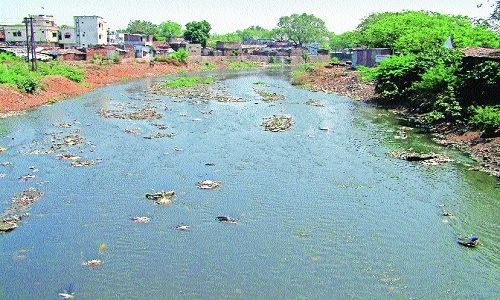Red tape impedes Nag river rejuvenation project
12 Jun 2023 08:01:29

By Sagar Mohod
The dream of Nagpurians to see the Nag River’s pristine glory restored may take longer before it sees light of the day. Bureaucrats are still whacking their brains on the terms of appointment of a consultant who can oversee the implementation of the ambitious Rs 2,738.77 crore pollution abatement project. The snail-pace implementation of such a prestigious project is heart-wrenching. The loud timelines, mega announcements and fanfare associated with laying of the project’s foundation stone have all vanished in thin air. That the signature river of the city -- the name of Nagpur has been derived from the river -- offers no seriousness to planners and bureaucrats is evident as they are working at their own leisurely pace, with total disregard to public expectations and sentiments.
Already 10 long years have passed since the project got approval. The delay in starting the work is agonising, said a city environmentalist while talking to ‘The Hitavada’. That Nag Nadi Pollution Abatement project is yet to start notwithstanding the fact that none other than Prime Minister Narendra Modi himself laid the foundation stone for the same, is something makes one ponder over other public projects. The process is stuck at finalisation of Request for Proposal (RFQ) stage to shortlist appointment of Project Consultant. The project is being implemented in joint co-ordination by Government of India and Japan International Co-operation Agency (JICA) wherein Nagpur Municipal Corporation (NMC) is going to get aid for tackling pollution in the signature river of the city. In December last, when the Prime Minister was in city to dedicate various public projects, he revived hopes of Nagpurians saying the ambitious Nag River project was finally on track.
However, six months have passed, and the process is still stuck for want of agreement between the two countries.
Mohd Israil, Consultant, Nag River Pollution Abatement Project, when asked about the delay, said that the RFQ for Consultant right now was under process. As the project involves two countries, it is natural for the process to take some time, as continuous negotiations and updations and revisions are needed while finalising the technical and financial documents. Israil further added that one particular plus point in the entire project was that Central Government had been quite pro-active on fast tracking the clearances. The officials of Union Ministry of Jal Shakti have already completed financial appraisals of the agencies that were shortlisted for possible appointment as Consultant. The Consultant is the key element as the agency posses necessary technical skills in ensuring that the project is moving in right direction. The earlier RFQ was needed to be withdrawn and revised one is now pending approval from both the Governments.
To a question, he said, it is expected by December end, the Consultant would be appointed. Post floating of RFQ, about three months period is required for tender process and finalisation of bids. Thereafter in second stage, tenders for agency to handle the pollution abatement scheme would be floated and same again involves minimum three months period. So by summer of 2024, the pollution abatement project work should begin, Israil further commented. As to work details, it involves setting-up pollution treatment centres on Nag River and its two tributaries, Pili Nadi and Pohara River. The river flows through Nagpur city is now a highly polluted water channel of sewage and industrial waste. The project is approved under the National River Conservation Plan and will be implemented by the National River Conservation Directorate (NRCD). The aim is to reduce the pollution level in terms of untreated sewage, flowing solid waste and other impurities flowing into the Nag river and its tributaries. Israil said the target is to treat the waste water at various treatment plants and release the treated water, it should be at par with outside bath water, back into the river. As per the plan, only the 17 km of the 42 km stretch that flows through the city would see setting-up of sewage treatment plants on its bank. They would be of different capacities and the waste that get accumulated in the centre would be lifted and dumped in Bhandewadi where already a plant to process it is established.
There is now plant to use the waste from sewage treatment centres for conversion to manure as concerns still remains over presence of some chemicals and biological elements, particularly the enzymes that are not suitable for use in farms, said Israil. Scientists world over are still working on how to isolate the harmful enzymes from the waste. However still some of the waste can be useful for preparing bricks for use in burning and other such items. NMC is keen to make some money out of the waste to recover partial cost that is capital cost of Rs. 304.41 crore, 15 per cent of total share, that it will invest in the project.